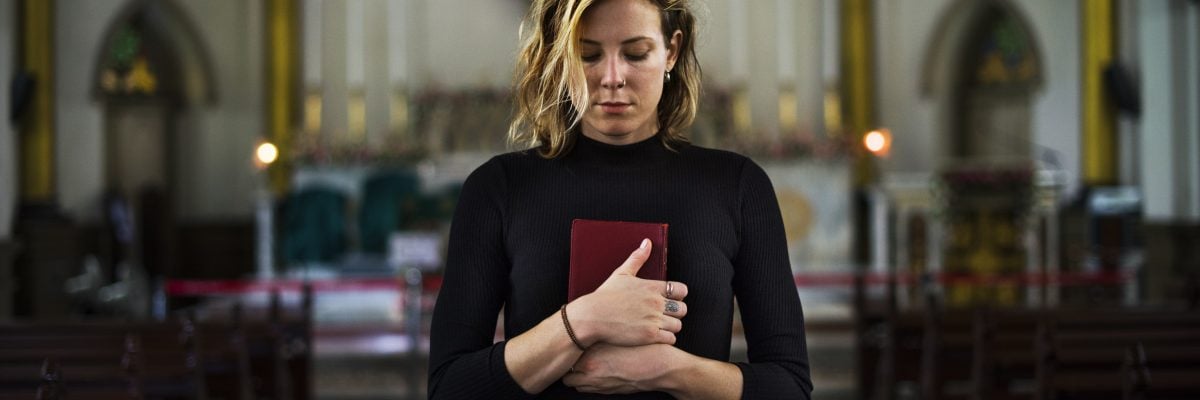
When someone becomes Catholic, he is expected to state, “I believe and profess all that the holy Catholic Church believes, teaches, and proclaims to be revealed by God.” How, though, can someone make such a profession without knowing everything the Church teaches? For most people that’s virtually impossible. The Catechism of the Catholic Church alone contains over 700 pages of doctrine!
The answer is found in the Catholic understanding of the nature of faith.
The Catechism defines faith as “man’s response to God, who reveals himself and gives himself to man . . . By faith, man completely submits his intellect and his will to God . . . it is a free assent to the whole truth that God has revealed . . . all that which is contained in the word of God, written or handed down, and which the Church proposes for belief as divinely revealed” (26, 143, 150, 182).
Faith, then, is not simply agreement with the doctrinal content of the Catholic religion. To count as true faith, we must make a free choice to trust in the Church’s religious authority. Otherwise, we are not really giving our assent (as a free act of the will), but just professing belief on some other grounds—convincing arguments, personal desire or experience, even ignorance. This is why “faith is a gift of God, a supernatural virtue infused by him” (CCC 153), and not simply an opinion one has come to by some other means.
St. Thomas Aquinas helps us flesh out the implications of this Catholic view. He says that true faith is not simply assenting to what is known (Summa Theologiae II-II Q. 2 A.1); after all, demons do this, but they do not have faith. Instead, faith requires an act of the will—not just the intellect. God does not reward or punish people for their knowledge, but for what they choose.
Heresy illustrates this distinction between mere belief and true faith. If faith were simply knowledge plus assent, then it would seem that a person who agrees with all but one point of Christian dogma can be said to have true faith in all those other points. But this is not the case. Aquinas explains:
Neither living nor lifeless faith remains in a heretic who disbelieves one article of faith. . . . He who adheres to the teaching of the Church, as to an infallible rule, assents to whatever the Church teaches; otherwise, if, of the things taught by the Church, he holds what he chooses to hold, and rejects what he chooses to reject, he no longer adheres to the teaching of the Church as to an infallible rule, but to his own will. Hence it is evident that a heretic who obstinately disbelieves one article of faith, is not prepared to follow the teaching of the Church in all things . . . such a heretic with regard to one article has no faith in the other articles, but only a kind of opinion in accordance with his own will. (ST II-II Q.5 A.3; see also Summa Contra Gentiles I.5)
So true faith includes a free-will trust in religious authority—not just accidental agreement with that authority on other grounds. For Christians, that authority is God’s revelation through the Church, whose Sacred Tradition produced Sacred Scripture and guards its orthodox interpretation.
So, if someone says he has Christian faith, yet disagrees with Church teaching on some point or points, it would have to be because he thinks the Church has erred. But this makes no sense unless he was not really assenting to the Church’s authority in the first place. However rigorous the process by which he reached his dissenting opinion, ultimately it was based on something besides submission to religious authority and thus—like his agreement with the Church in other matters—was not of true faith.
This understanding of faith explains why the Church can expect those who wish to become Catholic to make the profession of faith even before they know everything the Church teaches. The profession is not primarily about agreement with Church teachings (as is the case with membership in most Protestant churches) but about assent to the Church’s religious authority.
Catholicism asks for the assent of our will—not for the content of our intellect.
This has implications not just for converts but for seasoned Catholics, too. St. Paul says, “Examine yourselves, to see whether you are holding to your faith. Test yourselves” (2 Cor. 13:5). It is a good thing, then, to consider the nature of true faith with regard to our own beliefs. Do we only hold to the truths of Christianity because we are compelled by evidence or argument? If so, we do not possess true faith in those things. If our assent is limited only to what has been sufficiently demonstrated to us, then it is mere belief—and we are professing nothing more than our own opinion. It is not true faith, for it does not involve a choice to assent to religious authority.
As philosopher and Catholic convert Bryan Cross has noted, “’When I submit (only when I agree), the one to whom I submit is me.’ In other words, agreement with oneself cannot be the basis for authority over oneself.”
It is important to note that many points of dogma are not limited to being truths-of-faith in themselves. Although some things can only be held by faith because they are revealed by God alone (the Trinity, Christ’s incarnation, or the atonement), other religious truths can be held by the intellect as truths-of-knowledge apart from faith because they are open to rational or scientific demonstration (such as the historical reality of Jesus’ life, death, and resurrection, or the very existence of God). Although these latter may or may not be held by faith, one’s profession of assent to the Church will always demand assent to the former.
Lastly, it’s also important to note that the Church certainly does not expect submission of the will without good reason (see 1 Pet. 3:15; John 10:37-38; CCC 154-156; Aquinas, SCG I.6). But faith, nonetheless, cannot be reduced to those good reasons. Otherwise it would not be true that “faith is the assurance of things hoped for, the conviction of things not seen” (Heb. 11:1). This also explains why faith, not knowledge, is required to please God (Heb. 11:6).



